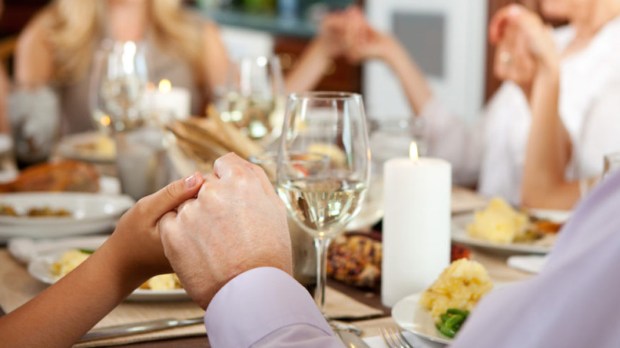Just a few days from now, family members with different beliefs and worldviews will sit down together for Thanksgiving dinner. It’s ironic that the Thanksgiving meal, the biggest holiday for allAmericans — and a gesture of communion and gratitude for everything in life, both good and bad — is also the one that can tear us apart … if we’re not careful.
If anyone knows something about diplomacy, whether between relatives or world leaders, it’s Fr. James Martin, a Jesuit priest and former missionary in Kenya. Missionaries travel to far-off places and live among people from very different cultures, people with very different values and experiences; the missionaries become part of those communities, forming positive relationships with people who might be indifferent or even hostile to their message. We asked Fr. Martin, who is also editor-at-large of America and the author of Jesus: A Pilgrimage, to share his seven best tips for peace and diplomacy at Thanksgiving dinner:
1. Bite your tongue
“The first step is shutting up,” says Fr. Martin. “There’s really no need to talk about politics or world events if you think it will cause controversy. Just as a practical matter: the holidays are stressful, and anyone who brings up politics is foolish, even mean. You wouldn’t bring up politics at a funeral or at a wedding” — other events in which logistics plus feelings combine for maximum emotional volatility — so just do your best to keep a lid on politics at the holiday dinner table too.
2. No name-calling
“The Gospel of Matthew, 5:22, tells us that if you call your brother a fool, you’re going to hell. We may laugh and roll our eyes, but Jesus is clear: don’t name-call. There is a time to speak and a time to be silent,” and this may very well be the time to hit the mute button on any nasty sobriquets.
3. Practice reflective listening
“Listen carefully,” said Fr. Martin, and “reflect” what the person is saying to you. For example, you could “reflect back” a person’s comments by saying,”It sounds like you’re really concerned about immigration,” or “It sounds like you’re worried about the economy.” You don’t need to insist you have the answer to their concerns in order to keep the lines of communication open. “Jesus met people where they were,” he said. “He spoke the language that people spoke. When you’re a missionary, you literally learn to speak the language — in my case, Swahili. When you’re talking to someone, you try to get inside their culture. God inculturated himself into our world — as Jesus. Really listen to people and accompany them.”
4. Comfort
“If people are feeling frightened, sad, upset, or confused, there’s an opportunity to listen and to love them. Welcome them and make them feel loved. Which was what Jesus did to people who felt excluded.”
5. Recognize that you too might be changed
“St. Ignatius of Loyola said ‘Go in their door and come out your door,’” said Fr. Martin. “If you’re not changed by these interactions too, it’s not an encounter. The refugees I worked with taught me a lot too.” Maybe you’ll see your own culture differently, after engaging with someone from a different one.
6. Recognize that no one has to come around to a certain way of thinking today
I asked Fr. Martin if he’d ever met a bad missionary, and he laughed. “A few times. They think they know everything, they’re arrogant, they don’t learn the language.” A good missionary, as he said, meets people where they are. “If someone wants to talk about art, you talk about art,” he said. “Or someone more intellectual might want to have more of an intellectual discussion. But you don’t say, ‘Here’s the Catechism, learn it by tomorrow,’” — a kind of tone-deaf pushiness that doesn’t go over well for missionaries or Thanksgiving dinner guests.
7. Be generous
Now you might be saying, “Well, I can behave, but what about my uncle or my sister, known loose cannons? What if they can’t help it with the digs and the jabs?”
Well, first of all, send them this story. And after that, “give people the benefit of the doubt,” said Fr. Martin. “Remember that most people have the best motives.” You may think they’re misguided or misinformed, but you don’t have to guide them or re-educate them today. There’s plenty of time for that. After all, Christmas dinner is only a month away.

Read more:
How to host someone with dietary restrictions for Thanksgiving
Read more:
Thanksgiving—It’s Not What You Think!

